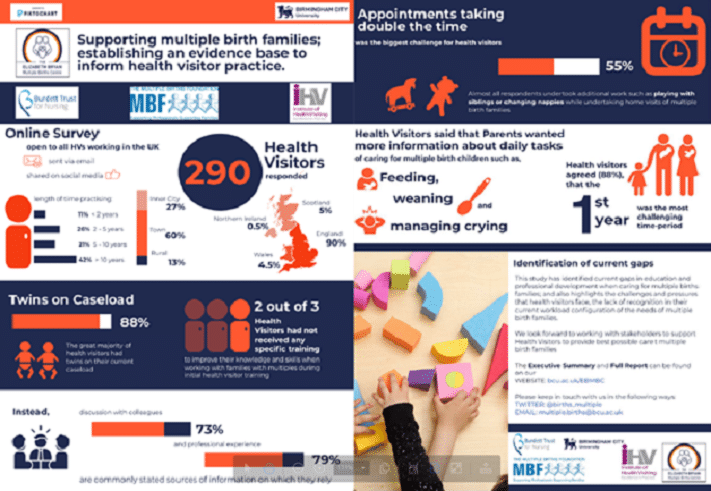12th July 2021
A Voices Blog sharing the research of the Elizabeth Bryan Multiple Births Centre, Birmingham City University.

Infographic of the study – Supporting multiple birth families; establishing an evidence base to inform health visitor practice’
Multiple births (twins, triplets or more) bring an increased risk of complications for the mother and her babies. A worrying or difficult pregnancy and birth can have a significant impact on postnatal recovery. Adapting to parenthood and caring for two or more children of the same age presents parents with physical, emotional, practical and often financial challenges. The first year can be particularly difficult, especially since many multiples are born pre-term. Health visitors are uniquely placed to promote multiple birth family health and wellbeing. However, there is currently a lack of evidence of how health visitors are able to support and address the concerns of multiple birth families whilst managing other competing demands of the service.
In the ‘Supporting multiple birth families; establishing an evidence base to inform health visitor practice’ study, we aimed to explore the experiences and perceptions of health visitors in supporting multiple birth families. We worked in partnership with the Institute of Health Visiting (iHV) and were funded by the Burdett Trust for Nursing. An online survey was distributed to practising health visitors in the UK. The questions focused on three key areas: the needs and challenges faced by multiple birth families; the challenges that health visitors encounter when supporting the families; and the education or professional development that health visitors had received about supporting multiple birth families.
We found that most health visitors have twins on their caseload. Health visitors were asked most by the parents about breastfeeding, weaning, crying and sleeping. Although health visitors have been taught about these aspects of care, few had received education within the context of multiple births and relied on their own experience and colleagues for advice. A significant challenge was the length of time of the appointments. The health visitors talked about carrying out ‘hidden work’ such as playing with siblings, or bathing and changing nappies during home visits. There was a clear call from the health visitors for further training to improve their knowledge and skills in the daily aspects of care, prematurity and bereavement.
The findings of the study provide an invaluable insight into the experiences of health visitors supporting multiple birth families, the wider challenges and pressures that they face, and the influence of workload configuration on providing an effective service.
At such a time of significant change, the skills, knowledge and support of health visitors is vital. We are calling for greater recognition of the needs of multiple birth families through more flexible service provision, a designated care pathway for multiple birth families, and education and professional development of health visitors.
View the infographic of the study here.
Read the full ‘Supporting multiple birth families; establishing an evidence base to inform health visitor practice’ report.
The Elizabeth Bryan Multiple Births Centre (EBMBC) is a collaboration between the Multiple Births Foundation and Birmingham City University. The vision of the centre is to deliver excellence in education, practice and research in the care of multiple birth families. To learn more about the work of the EBMBC, visit our website www.bcu.ac.uk/ebmbc or follow us on Twitter @births_multiple. We can also be contacted by email: [email protected]






